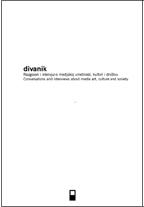kuda.org (eds.): divanik: Conversations and Interviews about Media Art, Culture and Society (2004) [English/Serbian]
Filed under book | Tags: · capitalism, internet, interview, media art, media culture, media theory, tactical media, technology

“divanik is a collection of interviews conducted in the period from 2001 to 2004 which represents intersection of research in the field of new technologies, culture and society. Interviews present network of people and organizations that make one part of the contemporary media art and theory scene. New media center_kuda.org monitored those phenomena that have interdisciplinary and intermedial character, and by inviting the significant protagonists in media art and theory the intention was to give to the local public an insight at the happenings in this field.
Research of the media is the research of the history of communication, and communication today is a bio-product of the information age, exchange of valuables in the capitalist coordinate system in which the concepts and ideas are treated as meaningful goods and products. On the other hand communication is also a tool that changes the same coordinate system.
As a communication practice the phenomenon of the interview is immanent to Internet culture. Interview represents concise form of communication and it is a useful instrument in the scientific work as meta-text that follows complex theory or artwork. In the interviews authors present contexts in which they were creating and their points of view and this direct communication through the actual questions presents real-time articulated energetic potential. That is also a chance to analyze and restructure certain topics in the form that couldn’t occur in theoretic and artistic work. Interview is a sublimation of different aspects, overlapping and interdisciplinarity that at a given moment presents unique thinking system.
The development of information and communication technologies also brought along new social ontology that is manifested in the social, political and culture field. Instantaneity of history, accumulation and pace of technological development stipulates momentary reaction and critical analysis.
The goal of these interviews is to critically analyze and present to the wider audience certain art and socio-political phenomena. Within the kuda.read edition the accent is put on pointing out to the expanded referential system inside the new media and culture that spreads from the marginal social practice to academic theory and scientific research.”
Includes interviews with Geert Lovink, Raqs Media Collective, Saskia Sassen, Marcus Neustetter, Bureau d’Etudes, Marina Grzinic, Cindy Cohn, and Steve Kurtz.
Serbian title: divanik: Razgovori o medijskoj umetnosti, kulturi i društvu
Publisher Daniel print, Novi Sad
kuda.read series, 003
Creative Commons Attribution-NonCommercial-ShareAlike 1.0 License
ISBN 8690621105
123 pages
PDF, PDF (updated on 2018-6-17)
Comment (0)Limina No. 1: Unidentified Narrative Objects – New Video Production and New Media Art (2010) [Italian/English]
Filed under journal | Tags: · internet, italy, media theory, new media, new media art, video, video art
This journal is the first of a series written by members of the Ph.D Planetary Collegium M-Node, and published by NABA Nuova Accademia di Belle Arti Milano. The series will be a collection of reflections and observations by the Ph.D researchers who are part of the programme, and by interpreters of the contemporary digital culture.
The Ph.D Planetary Collegium is an international network of research based on the rapport between art, design, philosophy, technology and science, which welcomes researchers from all over the world. It has been founded by Roy Ascott, a pioneer in telematic and cybernetics art, whose work has developed in the fields of arts, technologies and consciousness.
Questo volume inaugura una serie di testi di ricerca realizzati a cura del Programma dottorale Phd Planetary Collegium – M-Node ed editi dalla Nuova Accademia di Belle Arti di Milano. Una raccolta di riflessioni e di osservazioni realizzate dai ricercatori che partecipano al programma e da interpreti della cultura digitale contemporanea.
Editor: Francesco Monico
Scientific advisory committee: Francesco Monico, Derrick De Kerchkove , Antonio Caronia, Pier Luigi Capucci
Publisher M-Node, NABA Libri, Milan, May 2010
ISBN 978-88-95286-07-5
212 pages
PDF [Italian/English]
Comment (1)Jodi Dean: Blog Theory: Feedback and Capture in the Circuits of Drive (2010)
Filed under book | Tags: · blogging, blogosphere, capitalism, communicative capitalism, critical theory, facebook, floss, free software, media theory, neoliberalism, psychoanalysis, technology, utopia, web 2.0, youtube

“Blog Theory offers a critical theory of contemporary media. Furthering her account of communicative capitalism, Jodi Dean explores the ways new media practices like blogging and texting capture their users in intensive networks of enjoyment, production, and surveillance. Her wide-ranging and theoretically rich analysis extends from her personal experiences as a blogger, through media histories, to newly emerging social network platforms and applications.
Set against the background of the economic crisis wrought by neoliberalism, the book engages with recent work in contemporary media theory as well as with thinkers such as Giorgio Agamben, Jean Baudrillard, Guy Debord, Jacques Lacan, and Slavoj Zizek. Through these engagements, Dean defends the provocative thesis that reflexivity in complex networks is best understood via the psychoanalytic notion of the drives. She contends, moreover, that reading networks in terms of the drives enables us to grasp their real, human dimension, that is, the feelings and affects that embed us in the system.
In remarkably clear and lucid prose, Dean links seemingly trivial and transitory updates from the new mass culture of the internet to more fundamental changes in subjectivity and politics. Everyday communicative exchanges–from blog posts to text messages–have widespread effects, effects that not only undermine capacities for democracy but also entrap us in circuits of domination.”
Publisher Polity, 2010
ISBN 0745649696, 9780745649696
140 pages
Reviews: Jussi Parikka (Leonardo, 2010), Julia Lupton (LA Review of Books, 2012), Matthew Flisfeder (Reviews in Cultural Theory, 2012), McKenzie Wark (Public Seminar, 2015).
PDF (updated on 2020-5-31)
Comment (0)

